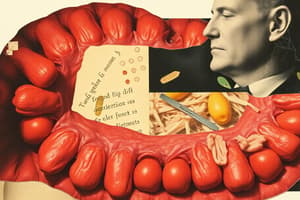Podcast
Questions and Answers
What is the primary function of digestive enzymes in the human body?
What is the primary function of digestive enzymes in the human body?
- Regulating blood sugar levels
- Producing hormones that control digestion
- Facilitating the breakdown of food into smaller, absorbable components (correct)
- Transporting nutrients to cells
Which digestive enzyme is responsible for breaking down carbohydrates?
Which digestive enzyme is responsible for breaking down carbohydrates?
- Protease
- Lipase
- Cellulase
- Amylase (correct)
Where does the majority of enzyme action for protein digestion occur?
Where does the majority of enzyme action for protein digestion occur?
- Mouth
- Small Intestine
- Pancreas
- Stomach (correct)
What role do hormones play in the function of digestive enzymes?
What role do hormones play in the function of digestive enzymes?
How do pH levels affect digestive enzymes?
How do pH levels affect digestive enzymes?
What can result from an enzyme deficiency in the digestive system?
What can result from an enzyme deficiency in the digestive system?
What type of enzyme is pepsin classified as?
What type of enzyme is pepsin classified as?
Which of the following statements about lipases is true?
Which of the following statements about lipases is true?
Flashcards are hidden until you start studying
Study Notes
Function Of Digestive Enzymes
-
Definition: Digestive enzymes are proteins that facilitate the breakdown of food into smaller, absorbable components.
-
Types of Digestive Enzymes:
- Amylases: Break down carbohydrates into simple sugars (e.g., starch to glucose).
- Proteases: Break down proteins into amino acids (e.g., pepsin in the stomach).
- Lipases: Break down fats into fatty acids and glycerol.
-
Sites of Action:
- Salivary Glands: Secrete amylase to begin carbohydrate digestion in the mouth.
- Stomach: Secretes pepsin for protein digestion, activated by acidic pH.
- Pancreas: Releases a mix of enzymes (amylase, proteases, lipases) into the small intestine.
- Small Intestine: Completes digestion with enzymes from the pancreas and intestinal lining.
-
Process of Digestion:
- Ingestion: Food enters the digestive system.
- Mechanical Digestion: Chewing and churning mix food with enzymes.
- Chemical Digestion: Enzymes break down food molecules into absorbable units.
- Absorption: Nutrients are absorbed into the bloodstream through the intestinal walls.
-
Importance:
- Nutrient Availability: Essential for the breakdown of macromolecules into absorbable forms.
- Metabolism: Enzymes play a role in nutrient metabolism and energy production.
- Health: Deficiencies or malfunctions can lead to malnutrition and digestive disorders.
-
Regulation:
- Hormones: Various hormones (e.g., gastrin, secretin) stimulate enzyme secretion.
- pH Levels: Enzymes operate best at specific pH levels (e.g., acidic in the stomach, alkaline in the small intestine).
-
Clinical Relevance:
- Enzyme Deficiencies: Conditions like lactase deficiency lead to lactose intolerance.
- Digestive Disorders: Pancreatitis may reduce enzyme production, affecting digestion.
- Supplementation: Enzyme supplements (e.g., digestive enzyme capsules) can aid individuals with enzyme deficiencies.
Digestive Enzymes Overview
- Digestive enzymes are crucial proteins that facilitate the breakdown of food into smaller, absorbable components.
Types of Digestive Enzymes
- Amylases: Enzymes that convert carbohydrates into simple sugars, such as starch to glucose.
- Proteases: Enzymes responsible for breaking down proteins into amino acids, with pepsin being a key example in the stomach.
- Lipases: Enzymes that split fats into fatty acids and glycerol.
Sites of Action
- Salivary Glands: Initiate carbohydrate digestion by secreting amylase in the mouth.
- Stomach: Produces pepsin for protein digestion, which is activated in an acidic environment.
- Pancreas: Releases amylase, proteases, and lipases into the small intestine for further digestion.
- Small Intestine: Completes the digestion process through enzymes from both the pancreas and intestinal lining.
Process of Digestion
- Ingestion: The entry of food into the digestive system.
- Mechanical Digestion: Physical processes, like chewing and churning, mix food with enzymes.
- Chemical Digestion: Enzymatic action breaks down food molecules into more absorbable units.
- Absorption: Nutrients pass through the intestinal walls into the bloodstream, facilitating nutrient uptake.
Importance of Digestive Enzymes
- Essential for transforming macromolecules into forms that can be absorbed by the body.
- Play an integral role in metabolism and energy production from nutrients.
- Malfunctions or deficiencies in enzyme function can lead to malnutrition and various digestive disorders.
Regulation of Digestive Enzymes
- Hormones: Hormonal regulation (e.g., gastrin, secretin) is critical for stimulating enzyme secretion.
- pH Levels: Each enzyme operates optimally at specific pH levels, such as the acidic conditions found in the stomach and alkaline conditions in the small intestine.
Clinical Relevance
- Enzyme Deficiencies: Disorders like lactase deficiency can lead to lactose intolerance.
- Digestive Disorders: Conditions such as pancreatitis may impair enzyme production, compromising digestion.
- Supplementation: Enzyme supplements, like digestive enzyme capsules, can support individuals with specific enzyme deficiencies.
Studying That Suits You
Use AI to generate personalized quizzes and flashcards to suit your learning preferences.




